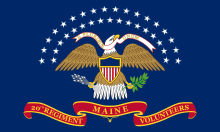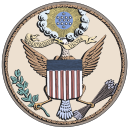Maine in the American Civil War

 |
|
Union states in the American Civil War |
|---|
|
|
| Dual governments |
| Territories and D.C. |
|
As a fervently abolitionist and strongly Republican state, Maine contributed a higher proportion of its citizens to the Union armies than any other, as well as supplying money, equipment and stores. No land battles were fought in Maine. The only episode was the Battle of Portland Harbor (1863) that saw a Confederate raiding party thwarted in its attempt to capture a revenue cutter.
Abraham Lincoln chose Maine's
Maine's contributors
Maine was so eager for the cause that it ended up contributing a larger number of combatants, in proportion to its population than any other Union state.[1] About 80,000 men from Maine served in the U.S. military as soldiers and sailors. They were organized into 32 infantry and two cavalry regiments, and seven light artillery batteries and one heavy artillery regiment. Hundreds of civilians served as nurses, doctors, relief workers, and agents at home and on the field of battle. Many served in the United States Sanitary Commission or United States Christian Commission, as well as similar organizations.[2] According to a letter by Walter Stone Poor, a Union soldier from Maine, his reason for fighting for the Union in the war was to end slavery, a cause he stated he would gladly give his life for:
What a splendid cause is this on which we are engaged. I think it is the grandest that ever enlisted the sympathies of man. Nobler even than the Revolution for they fought for their freedom while we fight for that of another race. I firmly believe that the doom of slavery is fixed and if it is not wholly rooted out by the present war, measures will be taken to wipe it out forever. If such an event can be consummated by any sacrifice of mine, it shall be cheerfully made. I could die for this as readily as I could lie down to rest at the close of a day of wearisome toil. Men have called this age dull. They can do so no more ... War is bad, heaven knows, but slavery is far worse. If the doom of slavery is not sealed by the war, I shall curse the day I entered the Army, or lifted a finger in the preservation of the Union. Of the old Union we have had enough and more than enough.
The homefront
During the early part of the war, several vocal abolitionist organizations kept the issue of slavery in the public eye. Newspaper editors informed the populace of the conduct and outcome of the war efforts. Maine factories produced ships, naval stores, and supplies, army equipment, tents, etc.
No Civil War land battles were fought in Maine, but anti-Confederate passions were inflamed in June 1863 when Southern raiders triggered the Battle of Portland Harbor after seizing a revenue cutter and trying to escape to the ocean.[7]
Notable leaders from Maine
Political
Hannibal Hamlin of Paris, Maine, was Lincoln's vice-president during his first term. A strong orator and opponent of slavery, he urged both the issuance of the Emancipation Proclamation and the arming of African Americans. He became aligned with Radical Republicans, which may have caused him to be dropped from the ticket in 1864.[8]
Union Army
More than two dozen men from Maine served in the Union army as generals, and dozens more Mainers led
Perhaps the most widely known officer from Maine to today's generation is
Other notable generals from Maine included
Brothers
Danville Leadbetter, born in Leeds, cast his lot with the Confederacy and became a general in its army.
Others, including
See also
- Maine Units in the Civil War
- People of Maine in the American Civil War
- History of Maine
- New Hampshire in the American Civil War
- Union (American Civil War)
References
- ^ Whitman & True, p. 21.
- ^ Maine Civil War Trails Retrieved 2008-10-13 Archived August 7, 2008, at the Wayback Machine
- OCLC 34912692. Retrieved March 8, 2016.
- ^ New York Historical Society (1966). New York Historical Society Quarterly. Vol. 50. New York: New York Historical Society. pp. 114–127. Retrieved March 11, 2016.
What a splendid cause is this on which we are engaged. I think it is the grandest that ever enlisted the sympathies of man. Nobler even than the Revolution for they fought for their freedom while we fight for that of another race. I firmly believe that the doom of slavery is fixed and if it is not wholly rooted out by the present war, measures will be taken to wipe it out forever. If such an event can be consummated by any sacrifice of mine, it shall be cheerfully made. I could die for this as readily as I could lie down to rest at the close of a day of wearisome toil. Men have called this age dull. They can do so no more ... War is bad, heaven knows, but slavery is far worse. If the doom of slavery is not sealed by the war, I shall curse the day I entered the Army, or lifted a finger in the preservation of the Union. Of the old Union, we have had enough and more than enough.
- ^ Poor, Walter Stone (May 15, 1861). "Letter to George Fox". Sandy Hook. Retrieved March 9, 2016.
- ^ "Brigadier General Thomas Lincoln Casey". Portraits and Profiles of Chief Engineers. Archived from the original on March 6, 2005. Retrieved May 12, 2005.
- ^ Harper's Weekly, July 11, 1863.
- ^ Biography at Mr. Lincoln's White House Retrieved 2008-10-13.
- ISBN 0-393-04758-X.
- ISBN 978-0-670-01840-6. p. 65.
- ^
 One or more of the preceding sentences incorporates text from a publication now in the public domain: Wilson, J. G.; Fiske, J., eds. (1891). Appletons' Cyclopædia of American Biography. New York: D. Appleton.
One or more of the preceding sentences incorporates text from a publication now in the public domain: Wilson, J. G.; Fiske, J., eds. (1891). Appletons' Cyclopædia of American Biography. New York: D. Appleton. {{cite encyclopedia}}: Missing or empty|title=(help) - New International Encyclopedia (1st ed.). New York: Dodd, Mead.)
{{cite encyclopedia}}: Missing or empty|title=(help - ^ Collins, Robert (2005). General James G. Blunt: Tarnished Glory. Pelican Publishing. p. 11.
- ^ Mundy, James H., No Rich Men's Sons: The Sixth Maine Volunteer Infantry, Cape Elizabeth, Maine: Harp Publications, 1994.
- ^ Obituary of Daggett, Portland Press Herald, 8/14/1938 Archived 2005-11-09 at the Wayback Machine Retrieved 2008-10-13.
- ISBN 0-88448-069-0.
- ISBN 0-89141-878-4.
- ^ University of Maine biography of Hamlin Archived 2012-01-18 at the Wayback Machine Retrieved 2008-10-13.
- ^
 This article incorporates text from the public domain Dictionary of American Naval Fighting Ships.
This article incorporates text from the public domain Dictionary of American Naval Fighting Ships.
Further reading
- Beattie, Donald A. and Rodney Cole. A Distant War Comes Home: Maine in the Civil War Era (1991) Excerpts; short popular essays
- Miller, Richard F. ed. States at War, Volume 1: A Reference Guide for Connecticut, Maine, Massachusetts, New Hampshire, Rhode Island, and Vermont in the Civil War (2013) excerpt
- Whitman, William E.S. and True, Charles H., Maine in the War for the Union, Lewiston, Maine, 1865.
